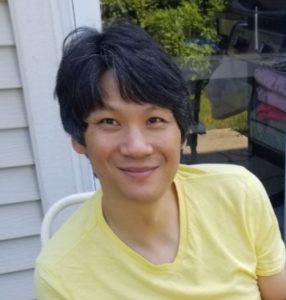
Writer Sung Kim
Sung Kim is a South Korean immigrant who came to the United States in 1984 at the tender age of ten with his parents and older brother. Sung’s practice in writing short stories has led him to the current challenge of working on two novels simultaneously. He has a degree in art and shares his thoughts on what it’s like to be a self-taught writer.
You are a graphic designer by trade, what attracted you to putting words on the page?
As anyone who enjoys reading, I too, since a young age, always wondered if I could write a book. When I first came across Cormac McCarthy I thought if only I could write just one paragraph or even a sentence like him, I would die a happy man. So, one day, after a long period of procrastination, I sat on my dining room table, pictured a scene in my head, and just wrote. To my surprise it was quite good. To this day, I think what I wrote on that kitchen table might be my best paragraph yet.
Why and how are you working on two novels at once?
It comes from my short story writing habits. I always write multiple, that way if I get stuck on one, I can continue on with another. I was hoping that it will carry over to novels, but so far it doesn’t seem to want to work as I am stuck on both novels. I am finding novels are a completely different animal from short stories.
What do you like about the short story format?
For a long time, I disliked short stories. I thought they were crude and unfulfilling, like they were some sort of an unfinished project or something. I only began writing them because of my wife’s suggestion—that they would help hone my writing skills. She was right, it helped tremendously. Then as I read more of them, to study them, I slowly came to like them. They were an acquired taste for me.
Who are your writer influences?
My biggest influences are Cormac McCarthy and J. M. Coetzee. These two, undoubtedly, have had the biggest influence in shaping the way I write, and even what I read. Their use of the English language can only be described as virtuosic. They use it like a master painter does to paint a picture; sometimes the strokes are long and fluid and sometimes short and textured. Words, simple English words, that I use every day are laid out in ways that come together so poetically that it just hammers my soul. It would be way too pompous of me to even strive to do what they do, but a man has dreams and sometimes the dreams are grand.
Your work often includes an interesting undertone. What role does tone play for you?
I believe tone is everything. It lets the reader know what they are getting into right off the bat. Also, a reader can decide on what to read by the tone of the author.
How do you overcome the struggles you face as a self-taught writer?
I have nothing but struggles. Or to better phrase it, I have struggles but I can’t even tell what I’m struggling with half of the time. As stated above, I am an art major, so I am kind of winging this writing thing as I go. My only teachers are the books I’ve read. It’s like trying to teach myself how to cook while never being taught what different spices do to different ingredients. It’s hard. As an art major I often hear people say something like, I really like this piece of art because it’s so dramatic. Yet when I ask them why they feel it’s so dramatic most can’t answer. They revert to the old, ‘Oh I don’t know, just because.’ There are reasons for everything and that’s why I believe education is important. I am missing that. I know I can write well sometimes and I know I’m bad sometimes, but I lack the knowledge of figuring out when and why. In time I will figure it out, just as the uneducated cook will in time. I will become a master of what I write. It will just take time, work, devotion. Plus, I plan on taking some classes in the near future, just in case.
Why did you join a writers’ group?
I needed a way to gauge myself, and I see a high hill to climb.
What was a worst moment when attending a BWW session that became a constructive element in your writing?
There was a time when I felt that the members were not getting what I was writing. Then I realized that most of them were not getting what I was writing. Hmmm… who is wrong in this scenario… It’s good to bounce things off a group.
What was your best critique moment when attending a BWW session?
I don’t know if I can point to a specific best moment as each critique has its good moments, but one thing I value most from a BWW critique is the frankness. I appreciate the honesty. Throughout my art studies I’ve dealt with many critiques and there is absolutely nothing worse than a “nice” critique. Might as well just go home and eat chocolates at that point.
You work a fulltime job, why is writing important to you?
I’ve always held a hobby of some sort. This writing thing started as a hobby, but it’s become more than that. I wish to make it a second career even if it leads me down the life of the starving writer. That’s why I’m working hard and saving up, so that I can be a starving writer without actually starving.
